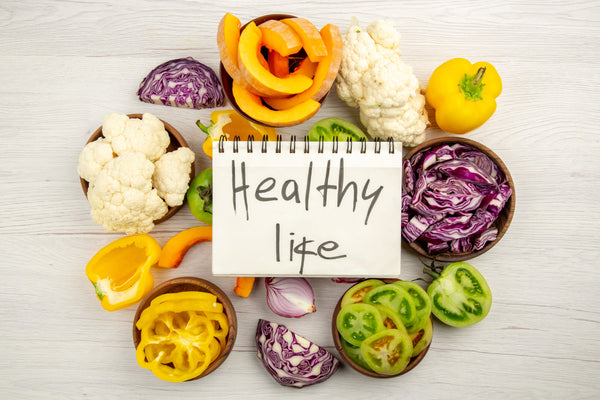Does my Diet Impact my PCOS?
by Elloww Team

Polycystic ovary syndrome (or, PCOS) is thought to impact anywhere between 3-10% of the global female population. Despite the fact that it impacts many women, it is still very poorly understood in terms of how diet or lifestyle might impact this reproductive disorder.
If left untreated, PCOS can impact fertility and can lead to a number of negative health conditions including type 2 diabetes and heart disease. Although there is no known cure for PCOS, there are certain healthy behaviours which may have a positive impact on symptom management!
Maintain a healthy body weight
It is estimated that anywhere from 40-60% of women who have PCOS are overweight or obese. Weight loss (even small amounts) can play an important role in PCOS management. Here are some tips for maintaining a healthy body weight:
- Eat small, frequent meals throughout the day to keep you full for longer and give your body the energy it needs to thrive
- Focus on fibre-rich foods like fruits, vegetables and whole grains - these will help to keep you full for longer, help keep blood sugars steady and keep your digestive system working properly
- Include protein rich foods (like meat, seafood, poultry, unsweetened greek yogurt, nuts, seeds, beans, chickpeas, eggs, etc.) to help keep your body full for longer
- Make sure you’re exercising regularly
Minimize your intake of refined sugars
Women with PCOS typically have insulin levels that are higher than normal. Insulin is a hormone that helps to turn sugars into energy within the body. Having consistently high insulin levels can lead to something called insulin resistance. This means that your body stops responding to insulin like it used to and your blood sugars remain high. Over time, this can lead to type II diabetes.
If you’re eating lots of refined carbohydrates, this can also cause your insulin levels to stay high. Make sure that you’re helping your insulin stay within normal ranges by decreasing your intake of refined carbohydrates (like sugary treats and white bread) and focusing on fibre-rich whole grains (whole grain bread, quinoa, etc.) instead.
Make sure you’re eating enough
Although weight management plays an important role in PCOS, it’s also essential to make sure that you are providing your body with the nutrition that it needs to thrive. Because there is such a hyper-focus on weight for PCOS, women with the condition are more likely to develop eating disorders than those without. In addition, women with PCOS often report higher levels of depression and body dissatisfaction. If you have PCOS and you’re feeling anxiety about how much you should be eating or feeling depressed about your body weight, you’re not alone! Make sure to speak with your doctor or a mental health practitioner.
Will a specific diet like keto or paleo cure my PCOS?
Not necessarily. Although there are some preliminary studies done in the area, there has been no conclusive evidence that a specific eating pattern (like keto or paleo) are guaranteed to help with PCOS. Your best bet - focus on eating nutrient dense whole foods and adopting other healthy behaviours like stress management, exercise and quitting smoking!
All of our meal plans focus on nutritionally balanced, fresh and whole foods. If you’re looking to lose weight, check out our weight loss plan here.
References:
Wolf, W., Wattick, R., Kinkade, O., & Olfert, M. (n.d.). Geographical Prevalence of Polycystic Ovary Syndrome as Determined by Region and Race/Ethnicity. IJERPH, 15(11), 2589. Retrieved April 29, 2020, from 10.3390/ijerph15112589
Teede, H., Deeks, A., & Moran, L. (2010). Polycystic ovary syndrome: a complex condition with psychological, reproductive and metabolic manifestations that impacts on health across the lifespan. BMC Med, 8(1). Retrieved April 29, 2020, from 10.1186/1741-7015-8-41
Moran, L. J., Pasquali, R., Teede, H. J., Hoeger, K. M., & Norman, R. J. (2009). Treatment of obesity in polycystic ovary syndrome: a position statement of the Androgen Excess and Polycystic Ovary Syndrome Society. Fertility and Sterility, 92(6), 1966–1982. Retrieved April 29, 2020, from 10.1016/j.fertnstert.2008.09.018
Lee, I., Cooney, L. G., Saini, S., Smith, M. E., Sammel, M. D., Allison, K. C., & Dokras, A. (2017). Increased risk of disordered eating in polycystic ovary syndrome. Fertility and Sterility, 107(3), 796–802. Retrieved April 29, 2020, from 10.1016/j.fertnstert.2016.12.014
Himelein, M. J., & Thatcher, S. S. (2006). Depression and Body Image among Women with Polycystic Ovary Syndrome. J Health Psychol, 11(4), 613–625. Retrieved April 29, 2020, from 10.1177/1359105306065021




